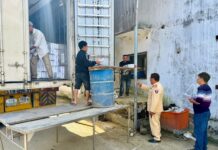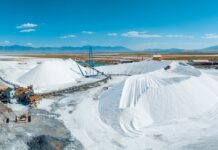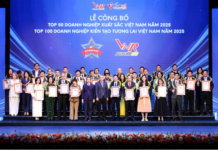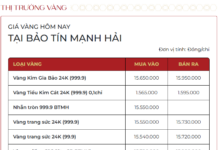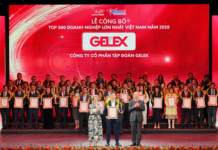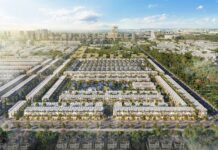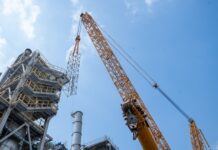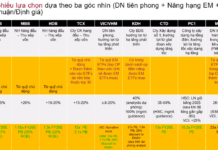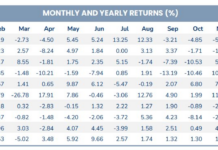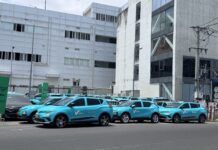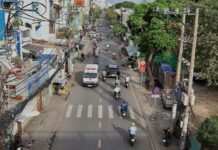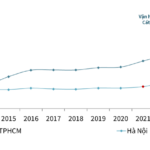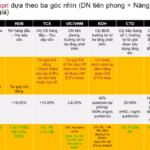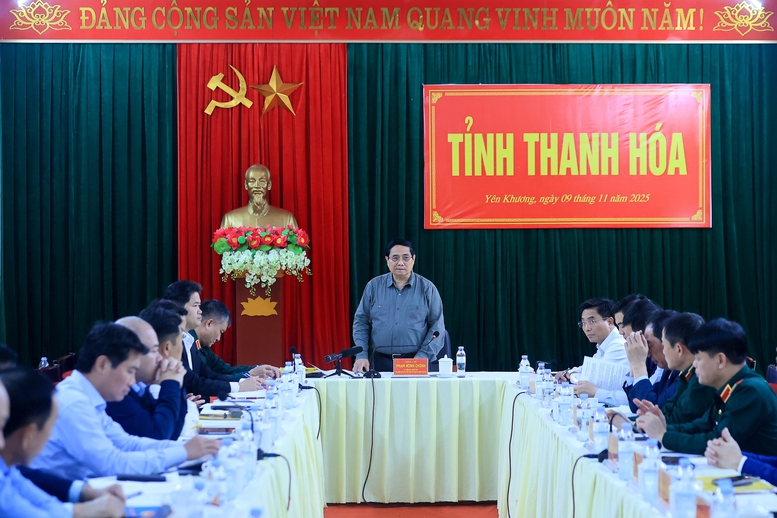
Prime Minister Pham Minh Chinh, alongside leaders from various ministries and sectors, held a working session with the Standing Committee of Thanh Hoa Provincial Party Committee. Photo: VGP/Nhat Bac
According to Thanh Hoa Province’s report, in the first nine months of 2025, the province’s economic growth rate reached 8.19%, placing it among the top localities with the highest GRDP growth rates nationwide. The economic structure has shifted positively, with significant increases in the industrial and service sectors.
Industrial production saw robust growth, with a 15.55% increase over ten months, compared to the national average of 9.2%. Key industries such as steel, electricity, cement, apparel, and footwear experienced substantial output growth.
Agriculture maintained stable development, with a rise in product value per unit area to 127 million VND/ha/year, a 2 million VND increase from 2024.
The trade and service sectors achieved impressive results, with a 15.1% increase in total retail sales and services, compared to the national average of 9.3%. Exports grew by 18.3%, surpassing the national growth rate of 16.2%, and tourism revenue increased by 33.7%.
State budget revenue placed Thanh Hoa among the top 10 localities nationwide. Public investment disbursement reached 66.7% of the plan, compared to the national rate of 54.4%, and foreign direct investment increased by 27.5%.

Prime Minister Pham Minh Chinh commended Thanh Hoa Province’s socio-economic development achievements across various sectors. Photo: VGP/Nhat Bac
Business development was positive, with a 12.9% increase in newly established enterprises compared to the same period last year. The province has actively promoted science, technology, digital transformation, and intellectual property development, completing 56 out of 93 assigned tasks on the Central Monitoring System. In 2024, Thanh Hoa ranked 5th nationally in the Digital Transformation Index.
The province effectively addressed post-disaster recovery and implemented social policies to support the poor.
Regarding the implementation of the two-tier local government model, Thanh Hoa has thoroughly absorbed, specified, and fully implemented the regulations, conclusions, directives, and orientations of the Central Committee. There is a high level of consensus and unity in awareness and action during implementation, with most assigned tasks completed on schedule and meeting quality standards.
The commune-level staff and civil servants are reasonably allocated (averaging 64 per commune), meeting professional and specialized requirements. Allowances and policies are implemented promptly and in accordance with regulations.
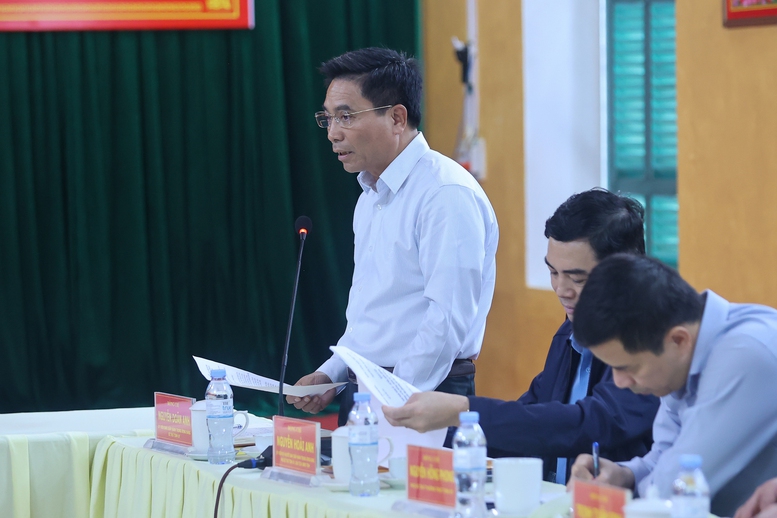
Nguyen Doan Anh, Secretary of the Thanh Hoa Provincial Party Committee, speaks at the meeting. Photo: VGP/Nhat Bac
Training and professional guidance have been emphasized. Infrastructure and information technology facilities have been invested in and upgraded (2.5 – 5.5 billion VND per commune/ward).
After four months of operation, the organization and activities of local governments in communes and wards have been smooth, continuous, and uninterrupted, ensuring close contact with the people and serving the public effectively (with a file resolution rate of 91.67%).
In his concluding remarks, Prime Minister Pham Minh Chinh praised Thanh Hoa Province’s socio-economic development achievements across various sectors, which have outpaced the national average. The implementation of the two-tier local government model has largely met the Central Committee’s requirements, ensuring quality and timeliness. The commune-level staff and civil servants are reasonably allocated, and operations have been smooth, continuous, and responsive to the needs of citizens and businesses.
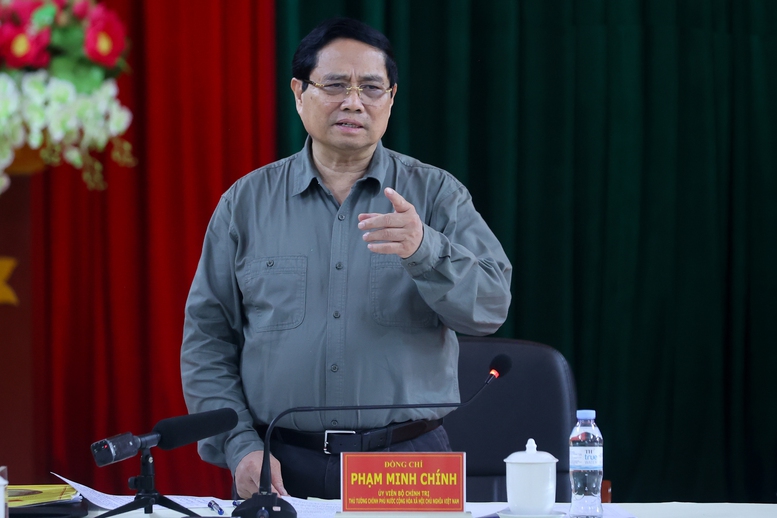
Prime Minister Pham Minh Chinh: Thanh Hoa must maximize its human resources, the largest and most distinctive potential, a key opportunity and competitive advantage for the province. Photo: VGP/Nhat Bac
However, challenges remain, including unsustainable economic growth and state budget revenue, the need for improved administrative procedures and business environment, inadequate infrastructure connectivity, and limited human resource quality.
Regarding future directions, tasks, and solutions, the Prime Minister provided guidance at the 20th Provincial Party Congress. During the meeting, he emphasized several key points.
The Prime Minister stressed that Thanh Hoa must maximize its human resources, the largest and most distinctive potential, a key opportunity and competitive advantage for the province, given its large population. People are both the goal, the center, and the subject, as well as the driving force and resource for development.
Additionally, the province should leverage its favorable natural conditions, strategic location, and diverse landscapes (forests, sea, plains, and mountains) to develop industries, agriculture, and services.
Effective governance is essential, along with fostering self-reliance, unity, and solidarity to harness the potential and advantages of human and natural resources. Preserving and promoting the rich cultural heritage and heroic historical traditions is crucial. A shift in mindset is needed, with a focus on long-term vision, ambitious thinking, and concentrated resource allocation for impactful results.
The province should actively develop science and technology, innovation, and digital transformation, while enhancing the effectiveness of the “Four Mountains” linkage (Lam Son, Sam Son, Nghi Son, and Bim Son). Completing infrastructure connectivity in transportation, telecommunications, and education is vital, as is promoting business development, creating favorable conditions for enterprises, and streamlining administrative procedures.
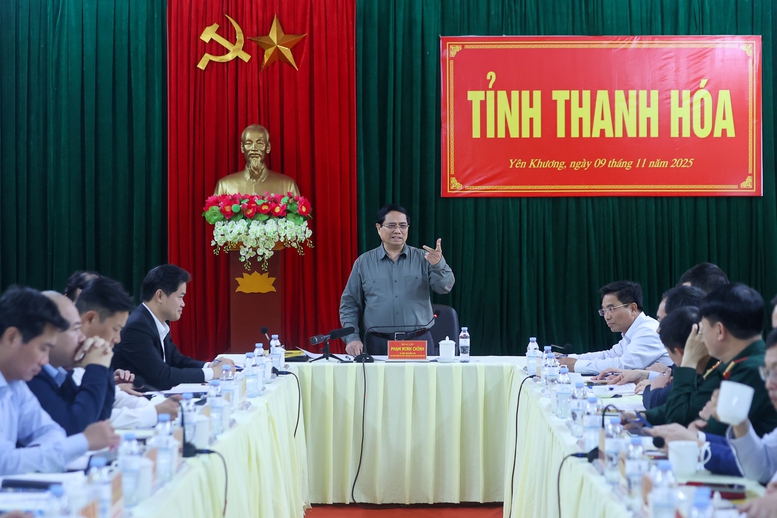
The Prime Minister urged Thanh Hoa to continue improving the material and spiritual lives of its people, especially in remote, ethnic minority, border, and island areas. Photo: VGP/Nhat Bac
Thanh Hoa should continue improving the material and spiritual lives of its people, especially in remote, ethnic minority, border, and island areas. Developing social housing, building primary and secondary boarding schools, and mobilizing local military forces to support school construction are essential. The province must increase revenue, save on expenses, and allocate resources for these programs.
The Prime Minister emphasized the importance of building a clean and strong Party organization, developing a capable leadership team, and strengthening the fight against corruption, negativity, and waste.
He also addressed several provincial proposals, including the dredging project for the Nghi Son port access channel in the Nghi Son Economic Zone, the expansion of the Nghi Son Oil Refinery Phase 2, investment in the national crude oil reserve depot, utilization of support funds under the special policy of National Assembly Resolution 37/2021/QH15, investment in the inter-regional transport route connecting Ho Chi Minh Road in Thanh Hoa Province to National Highway 6 and CT.03 Expressway in Phu Tho Province, and the number of deputy positions in specialized departments in communes and wards with high workloads.
Regarding the two-tier local government model, the Prime Minister noted the need to finalize functions, tasks, and job positions before assigning staff and implementing personnel policies.



